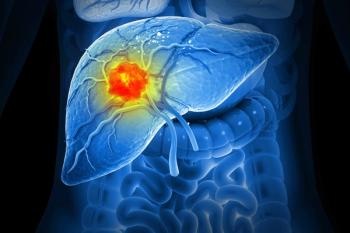
Migvis Monduy, MD, medical director of Neuromuscular and Movement Disorders Programs at Nicklaus Children's Hospital, discussed challenges in Duchenne muscular dystrophy (DMD) treatment access and how policy changes may support patients with DMD.

Rose is an editorial director at The American Journal of Managed Care® (AJMC®).
She has a BA in journalism & media studies and Spanish from Rutgers University. You can connect with Rose on LinkedIn.

Migvis Monduy, MD, medical director of Neuromuscular and Movement Disorders Programs at Nicklaus Children's Hospital, discussed challenges in Duchenne muscular dystrophy (DMD) treatment access and how policy changes may support patients with DMD.

The global burden of liver cancer is rising, and public health efforts for prevention, vaccination, and treatment to address underlying etiologies are needed, according to research presented at ASCO 2024.

The approval brings a new treatment option to pediatric patients with polyarticular juvenile idiopathic arthritis, which is a form of arthritis affecting multiple joints at the same time.

Amit Singal, MD, medical director of the Liver Tumor Program at UT Southwestern Medical Center, discussed the current outlook for patients with hepatocellular carcinoma (HCC) and how to choose between therapies.

Tumor necrosis factor (TNF) inhibitor use was associated with a lower risk of cardiovascular outcomes in patients with radiographic axial spondyloarthritis in a recent study.

Slowing the loss of ambulation in patients with Duchenne muscular dystrophy (DMD) may also mitigate worsening disease burden and overall function, according to a pair of posters presented at ISPOR 2024.

In the final overall survival analysis of the phase 3 CARES-310 trial, frontline camrelizumab plus rivoceranib continued to show clinically meaningful survival benefits vs sorafenib for hepatocellular carcinoma (HCC).

Distinct retinal vessel atrophy patterns may be associated with multiple sclerosis (MS), but further research is needed to assess retinal vessel changes and their underlying role in MS.

Among patients with rheumatoid arthritis (RA) and psoriatic arthritis (PsA), intense pain symptoms were associated with poor sleep, fibromyalgia, depression, and sleep apnea.

A large Medicare cohort study found that the most common locations of procedurally treated keratinocyte cancers in the US were the head and/or neck for both squamous cell carcinomas and basal cell carcinomas.

A recent review highlighted several candidate biomarkers for diagnosing axial spondyloarthritis associated with inflammatory bowel disease in early phases.

Amit Singal, MD, medical director of the Liver Tumor Program at UT Southwestern Medical Center, discussed how the etiologies of hepatocellular carcinoma (HCC) and underlying liver function impact treatment approach.

Migvis Monduy, MD, medical director of Neuromuscular and Movement Disorders Programs at Nicklaus Children's Hospital, discussed the most promising areas of research in Duchenne muscular dystrophy (DMD), as well as the mechanisms of gene therapies for DMD.

Newly published findings from the pivotal phase 3 BE HEARD I and BE HEARD II trials demonstrated that bimekizumab was well tolerated and produced clinically meaningful responses in patients with moderate to severe hidradenitis suppurativa.

A retrospective analysis found glucocorticoid treatment to reduce comorbidities in adults with Duchenne muscular dystrophy (DMD) and assessed the relationship between anthropometric measures and respiratory function and functional abilities.

Areas of focus in the annual report included health system utilization and recovery from the pandemic, patterns of medicine use, drug pricing, and patient out-of-pocket costs.


A recent study found that screening for hepatocellular carcinoma (HCC) is associated with reduced mortality, highlighting the need to promote HCC screening for patients with known risk factors.

The findings add to recent research on the growing utilization, expenditure, and prices of Duchenne muscular dystrophy (DMD) therapies in the current landscape, an area health care policy could potentially address.

Public hospitals were significantly more likely to sustain access to unprofitable services following 340B Drug Pricing Program participation, while nonprofit hospitals were mostly unaffected, according to a recent study.

Posters presented at the ISPOR—The Professional Society for Health Economics and Outcomes Research meeting explored Duchenne muscular dystrophy (DMD) caregiver experiences and gene therapy’s impact on work opportunities for caregivers.

The Inflation Reduction Act (IRA) has potential to shift incentives for drug manufacturers and impact the amount of long-term evidence generated for approved drugs, said Julie Patterson, PharmD, PhD, senior director of research at the National Pharmaceutical Council.

Michael Morse, MD, FACP, MHS, medical oncologist at Duke Cancer Center, explained gaps in care access and equity that must be addressed to ensure all patients with liver cancer can get the treatments they need.

Neil Goldfarb, president and chief executive officer of the Greater Philadelphia Business Coalition on Health (GPBCH), shared insight into the themes and sessions at the upcoming GPBCH Annual Conference taking place June 6, 2024.

Leaders at 49 accountable care organizations (ACOs) shared their perspectives on the Medicare Shared Savings Program, as well as a range of strategies for success and ongoing challenges.

A predictive model using plasma proteins as biomarkers predicted hepatocellular carcinoma development more accurately than a model based on traditional lifestyle risk factors in a recent study.

Adding olaparib to maintenance therapy with bevacizumab was associated with significantly longer survival for patients with ovarian cancer whose tumors have a BRCA-like genomic profile, but not among those with non-BRCA-like tumors, a study found.

The study aimed to improve the understanding of lived experiences and the fear of recurrence among survivors of localized, stage 0 to IIA cutaneous melanoma.

A recent study suggests virtual reality and biofeedback training may be feasible and effective for patients with Duchenne muscular dystrophy (DMD) and Becker muscular dystrophy (BMD).

Michael Morse, MD, FACP, MHS, medical oncologist at Duke Cancer Center, explained the importance of managing toxicities in the changing hepatocellular carcinoma (HCC) treatment landscape to ensure patients have the best possible outcomes in the front line and beyond.

259 Prospect Plains Rd, Bldg H
Cranbury, NJ 08512
© 2025 MJH Life Sciences®
All rights reserved.
